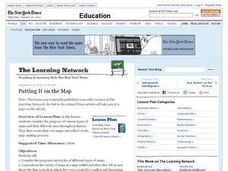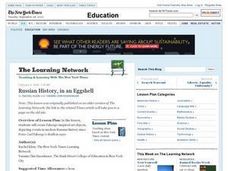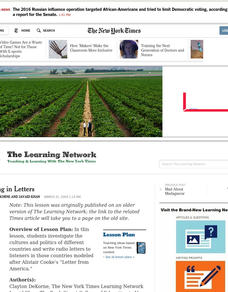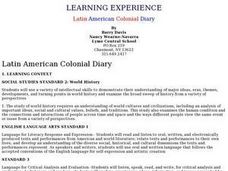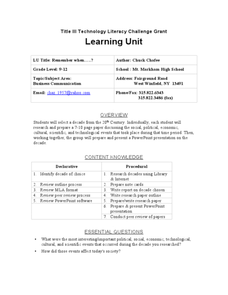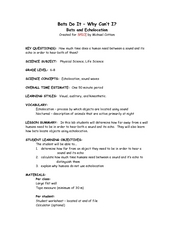Curated OER
Putting It on the Map
Young scholars consider the purpose of various types of maps and their different uses throughout history. They create their own maps and reflect on the map-making process.
Curated OER
Russian History, in an Eggshell
Students create Faberge-inspired art objects, depicting events in modern Russian history since Peter Carl Faberge's death in 1920. Students research the life of Peter Faberge. They write a short biography explaining how he became an...
Curated OER
Talking Over the Wall
Students explore how conflict resolution techniques can be used to resolve difference of opinion, both on a global and local scale. Students write in a journal about conflict using a phrase from the article as a starting point. ...
Curated OER
Building on the Past
Students consider how the scientific advances of the past have contributed to the science topics reported on today in the Science Times section. After reading a current science article, they compare and contrast the way science was...
Curated OER
Picking Up the Pieces and Putting them Back Together
Students examine how a breaking news story is constructed, first by predicting what facts and details must appear in what order, and then by assembling the story from cut-up pieces. They practice writing their own 'breaking news' lead...
Curated OER
A Story of Democracy
Students focus on the recent Mexican elections to evaluate how different journalistic accounts can present different aspects of the same event.
Curated OER
Reporting in Letters
Students investigate the cultures and politics of different countries and write radio letters to listeners in those countries modeled after Alistair Cooke's "Letter from America."
Curated OER
Separate Lives
Students read a New York Times article to explain apartheid and its legacies. They examine prejudice in their own lives by looking a the perception of discriminatory traits.
Curated OER
Diaries and Memoirs
Students analyze how personal diaries and memoirs record actual events, compare and contrast diaries and memoirs from the Holocaust, and engage in journal or diary writing as a way to explore one's own feelings and self.
Curated OER
Diaries and Memoirs
Seventh graders analyze how personal diaries and memoirs record actual events. In this World History lesson, 7th graders compare and contrast diaries and memoirs from the Holocaust. Students write as a way to explore one's own feelings...
Curated OER
Multi-Media Hero Analysis
Students consider how the attributes of heroes have evolved. In this character traits lesson, students define heroism in their culture and research the epic heroes of literature. Students select heroes to write about and share their...
Curated OER
Artful Technology
Students read the article 'Fading Indian Rock Art Saved, at least in Database' and discuss its contents. After viewing examples of works from a variety of periods and places, students choose a time and place on which to conduct research.
Curated OER
Writing A Business Letter Who, What, and Where Are They
Seventh graders word process business letters using proper tab settings, spell checking, grammar and punctuation. They use the Internet to search for names and addresses.
Curated OER
Latin American Colonial Diary
Students examine the class systems of New Spain. In small groups, they create a five-day diary about the family life, food, occupation, and government involvement of an assigned personality from the time of Colonial Latin America.
Curated OER
Empowering "Crack Is Wack" Mural
Pupils create an anti drug mural inspired by the work of Keith Haring. In this mural lesson plan, students use line, color, and Haring people.
Curated OER
Remember When?
Students work in cooperative groups to research life in a decade of the 20th century. Each group member writes a 7-10 page paper highlighting the social, political and cultural events and the group presents a Powerpoint presentation to...
Curated OER
Governance
Third graders participate in decision-making situations. In this social studies lesson students make connections between rules and laws and the purposes for those rules and laws. Students use critical and creative thinking skills to...
Curated OER
The Reasons for the Season
Students explain the reason for the changes in season. In this lesson examining the relationship between the Earth and the Sun, students use an applet to discover how the alignment of the Earth and the Sun cause the change in seasons.
Curated OER
Pesticides and Eggshell Thinning.
Students analyze the calcium content of egg shells as an introduction to the toxic effects of pesticides on biological systems.
Curated OER
Olympics (Grade 4)
Young scholars research information about the current Olympic research. In this Olympic research lesson, students take a pre-test to determine their knowledge about the current Summer Olympics. They choose one of three areas to research...
Curated OER
Bats Do It-Why Can't I?
Middle schoolers explore echos and how they are utilised in navigation. In this sound lesson students calculate the amount of time between a sound and its echo.
Curated OER
Needs and Wants
First graders recognize the difference between needs and wants. In this treaty instructional activity, 1st graders chart their needs and wants to be used in making a treaty. Students negotiate what should be in the treaty based on the...
Curated OER
Global Warming and Hurricanes: Is an Increase in the Number of Stronger Hurricanes an Indicator of Global Warming
Ninth graders investigate whether stronger hurricanes are signs of global warming. In this environmental science lesson, 9th graders research both sides of the issue about global warming. They debate for or against this issue in class.
Curated OER
Frogs
Students explore the external and internal structures of an amphibian and how frog anatomy compares to human anatomy. They collect pictures of a frog using a digital camera, create a web page, develop a PowerPoint presentation, and...


